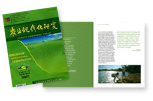- You are here: Home > Research > Research Progress
Dietary nutrients play a critical role in embryonic development and subsequent offspring body weight, which makes nutrition an important factor to consider when rearing sows.
Previous studies showed that maternal serine supply improved the amino acid composition in milk, and maternal serine deficiency affected the anti-oxidant ability of offspring. These results indicated that serine level in sow diet may affect offspring performance.
However, whether maternal serine supply has any effects on body weight of offspring piglets and related metabolic consequences remains unknown.
Researchers from the Institute of Subtropical Agriculture (ISA) of the Chinese Academy of Sciences investigated how different levels of maternal dietary serine from late pregnancy to lactation affect sow reproductive performance and offspring performance, the metabolome of milk, as well as the serum of sows and their offspring.
A total of 72 multiparous sows (Yorkshire × Landrace) were randomly divided into four groups with 18 in each group, and fed with different levels of serine.
The researchers found that sows fed with a diet supplemented with 25% serine of the basal diet had the highest litter weight, and highest average piglet weight at birth and aged 21 days.
They also found that a large number of metabolites in both colostrum and milk differed significantly between sows fed with a basal diet and a diet supplemented with 25% serine of the basal diet.
Importantly, most of these metabolites are involved in purine and pyrimidine metabolism, glutathione and taurine metabolism, as well as phospholipid and sphingolipid metabolism, which may contribute to the growth-promoting effects of serine on offspring.
"Our findings support the potential use of serine as a new feed additive for improving sow reproduction and body weight of offspring piglets," said ZHOU Xihong, a researcher in ISA.
The study was published in Food & Function. It was supported by the National Key Research and Development Program of China.
Contact: ZHOU Xihong,
Email: xhzhou@isa.ac.cn
Institute of Subtropical Agriculture, The Chinese Academy of Science
Address: Mapoling of Changsha City, Hunan province, P.R.China.Tel: +86-731-4615204 Fax: +86-731-4612685

